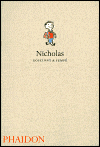
The Telegraph has published a series of intriguing articles on recent children's literature today.
Lorna Bradbury puts forth the claim that "the best stories are about things going wrong." And, first on her list of such stories are Jill Murphy's Worst Witch books. Bradbury writes, "more than two decades before J K Rowling dreamt up her young wizard, Jill Murphy's stories about Mildred Hubble were charming a generation of young readers." Mildred really is a wonderful character--bumbling, always getting into trouble, but well-meaning. You know the sort. Bradbury has some more favorites featuring trouble-prone protagonists, including:
- Philip Ardagh's Eddie Dickens series
- A new Dick King-Smith title Hairy Hezekiah, "a charming tale from the master of farmyard fantasy."
- Rollo Armstrong and Jason White's Safe from Harm, a "a dream-like story about a boy who runs away from home."
+++++++++++++++++++++++++++++++++++++++
Toby Clements' discusses new picture books while considering the following problem: "Journalism is meant to be read only once, literature twice, but what about children's picture books? A hundred, two hundred times? To survive this kind of scrutiny - from adult and child - a successful picture book has to have some indefinable added value, and this year, in among all the mush about fairies and zoo animals and so forth, there has been a great crop." Most of the titles are British, but the review is interesting nonetheless.
+++++++++++++++++++++++++++++++++++++++
Will Cohu takes a look at middle-grade fiction and finds, "The publishers like their headline novelists to be scarcely out of nappies but, when it comes to writing for the 8-12 age group, they believe that granny knows best." Lots of usual suspects on this list (Adèle Geras, Geraldine McCaughrean) and a few grandfathers (?) as well, but I was most intrigued by the following paragraph:
- Outstanding among these books are a couple of quite wonderful novels about juvenile courage by two of the best children's writers of the age, both of whom pit the common sense of children against the hapless fantasies of adults. In Jan Mark's The Electric Telepath, Elijah, a boy of the 1890s, longs for a life of science but finds himself restricted by his father's Christian sect. Caught with a home-made electrical apparatus, he pretends it is a machine for the transmission of God's "still, small voice". So begins a sad, comic farce, in which the financial potential of Elijah's invention is exploited by unscrupulous believers.
The other outstanding book? None other than Geraldine McCaughrean's The White Darkness, of course.
+++++++++++++++++++++++++++++++++++
Love the title of the next article: Sarah Crompton is gripped by demons, dragons and gnokgoblins. She's not alone.
Two boys, Arthur and Augusto, cast their votes with Crompton and the result is plenty of fantasy on this list including Eldest and Cornelia Funke's Inkspell.
+++++++++++++++++++++++++++++++++++
William Leith contents "the best stories are about escape." Leith especially appreciates Michael Morpurgo's Billy the Kid and writes, "I'm amazed by how well Morpurgo packs a story with events; he can hardly keep still for a paragraph. Needless to say, the tale is beautifully told. But it gets sadder and sadder." Other escape novels Leith recognizes include:
- Joel Snape's Itching for a Fight
- Jackie Andrews's Fire and Ice: Blood Feud
- Benedict Jacka's To Be a Ninja
+++++++++++++++++++++++++++++++++++
Helen Brown "enjoys eye-opening dramas on a global scale." Brown finds this year's selection superior and writes, "This year's excellent selection of "fiction for young adults" should rescue them from boredom. In addition to eye-opening dramas set in our own country, there are powerful accounts of adolescence in Africa, China, Sweden, Germany and America." Titles reviewed include:
- Allan Stratton's "unforgettable" Chanda's Secrets (set in southern Africa)
- Sally Grindley's "beautifully written" Spilled Water (set in China)
- It's off to Sweden with Stefan Casta's "wholesome" Summer With Mary-Lou
- The U.K. sets the scene for Sandra Glover's Spiked! and Rebecca Ray's A Certain Age
- And, we're in the U.S. with Mary Hogan's The Serious Kiss
- Finally, Brown recommends Zoran Drvenkar's seasonal spooker, Tell Me What You See . Translated from the German
+++++++++++++++++++++++++++++++++++
Serena Davis reviews new art books for children and Robert Hanks reviews A Little History of the World by E H Gombrich (and finds it, in short, "a delight").
+++++++++++++++++++++++++++++++++++
Elena Seymenliyska reviews Nicholas by René Goscinny and Jean-Jacques Sempé. Nicholas' world, Seymenliyska finds, is a beautifully simple one:
- Imagine a world in which there is no television, where children who bunk off school get so bored they wish they were in maths class instead, and where the worst that can happen to a naughty boy is to be sent to bed without pudding. Nicholas is that naughty boy, and these 19 stories - including the time the school inspector came to visit, the time Nicholas found a stray dog, and the time he smoked a cigar with his best friend - are his world.
The Telegraph doesn't often publish articles on children's literature, but when they do, they sure do it right. Happy Reading!






